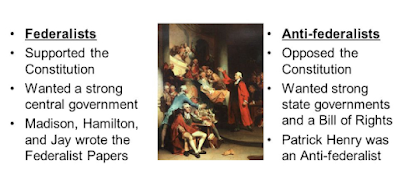In retrospect, the Anti-Federalists seemed destined to lose because they conceded too much. (They were also handicapped, as [Pauline] Maier and [Gordon S.] Wood documented, by newspaper bias toward the Federalists, who were concentrated in the cities and towns). Anti-Federalists objected to power, but only up to a point. They were willing to accept a stronger national government, and they accepted taxation, regulation, and other government activism at the state and local level. This reduced the force of their case against the Federalists. They were arguing not about power per se, but about which level of government should have the upper hand. That made the difference a matter of degree not kind, which gave the advantage to the nationalists. "In any conflict between two men (or two groups) who hold the same basic principles," Ayn Rand wrote in "The Anatomy of Compromise," "it is the more consistent one who wins." Unfortunately, the Federaliss were the more consistent.
~ Sheldon Richman, America's Counter-Revolution, pp. 10-11


No comments:
Post a Comment